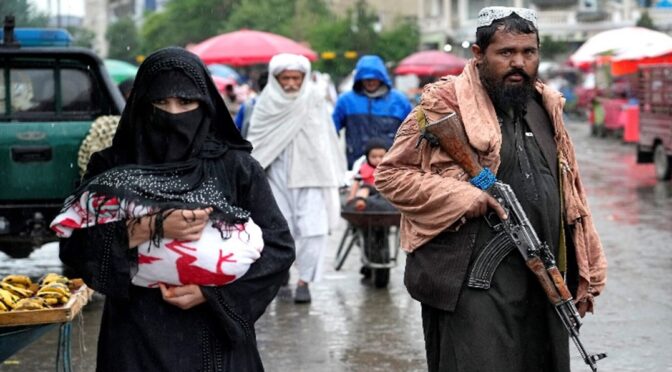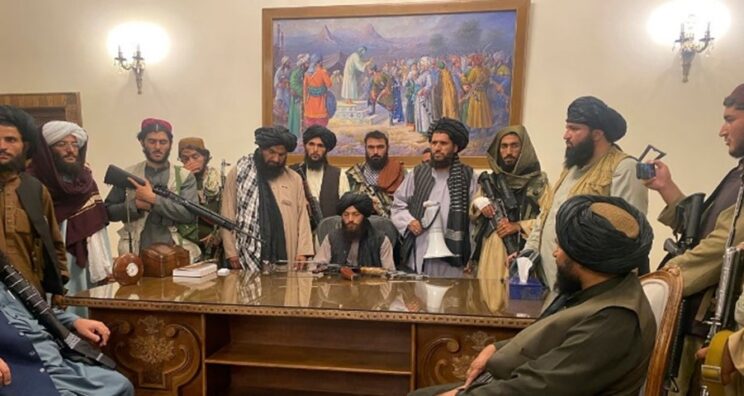The Afghan Women Skills Development Center
Posted on : May 13, 2024Author : Debendra Sanyal

August 2021 saw the unfolding of a major dramatic moment in the history of Afghanistan. The Taliban, a militant movement group which espoused radical Islamic fundamentalism, were able to pull off a successful insurgency, which pushed the Western military forces, led by the United States, out of the country. The Taliban had earlier controlled Afghanistan from 1996 to 2001, before they were overthrown by the American forces as retribution for the terror attack in New York in September 2001. The Taliban then waged a two-decade-long insurgency, in order to drive out the Western forces.
While this was a major defeat for the United States, the real losers of this conflict were the women of Afghanistan. The first Taliban regime committed rampant human rights violations and discrimination against women, barring them from all forms of employment and education, enforcing harsh punishments like caning for offences, and imposition of the burqa. The second regime which came in 2021 was like old wine in a new bottle, as Afghanistan once again went back to the dark days of the previous Taliban rule. Amidst all the gloom and despair, one organization stood up, and became perhaps the only ray of hope for the women of Afghanistan. In this article, we are going to look at the Afghan Women Skills Development Center, whose efforts recently received international recognition.

Sharia and the condition of women in Afghanistan
Amidst all the gloom, there are a few civil society organisations in Afghanistan, which are trying to safeguard the rights of Afghan women. One such organisation is the Afghan Women Skills Development Center. It was formed in 1999 in Pakistan, during the first regime of the Taliban, and relocated to Afghanistan in 2001 after the fall of that regime. In the two decades that followed before the next Taliban regime came in, the organisation worked tremendously hard to promote women’s rights and their participation in all walks of life. They established the first Women Protection Center in the country in April 2003, wherein women who were escaping gender-based violence could take refuge, along with their dependents. From their base in Kabul, they began to expand, and established such protection shelters in other provinces as well. The organisation has been engaged in promoting women’s rights through advocacy, lobby, mobilizing and increasing women’s capacity to claim their rights, developing the capacity of the women and exhorting men to act more responsibly. Apart from protection shelters, the organisation also engages in capacity-building initiatives and enhancing women’s access to justice. For example, capacity building workshops and conferences were conducted in Kabul, Herat, Balkh and Kapisa to support the Ministry of Women’s Affairs for prevention and elimination of sexual violence. Religious scholars, university students, and civil society organisation activists participated in these programmes. They have also partnered with international organisations like Norwegian Church Aid and the United Nations, and organised capacity-building and awareness programmes in collaboration with them. For e.g., in 2022, in partnership with UNHCR, AWSDC has been running two women community centers in Balkh, and this has been scaled up in provinces such as Kunduz, Samangan, Bamiyan, Kandahar, and Paktia. AWSDC has also engaged in promoting peacebuilding in Afghanistan, by setting up community-based peacebuilding conflict resolution counsels, or peacebuilding shuras. Since 2013, the organisation has established more than a hundred Peacebuilding Shuras in provinces such as Parwan, Kapisa and Faryab, and these shuras have resolved over 500 cases.
Even after the Taliban takeover in 2021, the AWSDC continues to play the leading role in securing the rights of women and girls in the country. They have been providing gender mainstreaming training and resources to national non-governmental organisations to build their capacity for inclusive service provision and engaging women in the project planning, implementation and monitoring. Additionally, a ‘gender from Islamic perspective’ guideline has been developed, which assists the NGOs in including women and girls in all their humanitarian and development interventions in Afghanistan. At the time of the Taliban takeover, there were 27 organisations operating women’s shelters across the country. At present, only the AWSDC shelters are active, running eight family centres in eight provinces across Afghanistan. (Yle, 2023) The efforts of the AWSDC received international recognition in 2023, when they received the International Gender Equality Prize 2023 in Tampere, Finland. As part of the award, the organisation will receive funding to the tune of €300 thousand from the Government of Finland. Mahbouba Seraj, an Afghan journalist and women’s rights activist who currently runs the AWSDC, announced in her award acceptance speech, “With the money made possible by this, I am going to go back home and I am going to spend it on a project that is going to take all of those women involved and I am going to make sure that they all know this award was given to me by one of the most amazing countries in the world that has gender equality as the first order of its government.” (Seraj, 2023, as cited in Yle, 2023)

Conclusion
Under the Taliban regime, the interpretation of the sharia has been influenced by radical, militant ideology and Pashtun tribal codes. The women of Afghanistan have been subjected to grave human rights violations and gender-based violence, and their education and employment opportunities have been severely curtailed, along with other civil liberties. In the midst of this, certain organisations stepped up in the country to protect their rights, particularly the Afghan Women Skills Development Center. The organisation’s efforts received international recognition and acclaim, and they will continue to strive in their endeavour of securing the rights and liberties of the women of Afghanistan.
___________________________________________________________________________
References
Chalabi, M. (2023, August 15). Women in Afghanistan: From almost everywhere to almost nowhere. UN Women. https://www.unwomen.org/en/news-stories/feature-story/2023/08/women-in-afghanistan-from-almost-everywhere-to-almost-nowhere
Ghantous, N. (2023, August 31). 3 Countries where Sharia Law is Hardest on Women. Fair Planet. https://www.fairplanet.org/story/3-countries-where-sharia-law-is-hardest-on-women/
Kharroub, T. (2015, October 4). Five things you need to know about women in Islam: Implications for advancing women’s rights in the Middle East. Arab Center Washington DC. https://arabcenterdc.org/resource/five-things-you-need-to-know-about-women-in-islam-implications-for-advancing-womens-rights-in-the-middle-east/
Yle. (2023, December 11). Finland awards international equality prize to Afghan women’s shelter. https://yle.fi/a/74-20064427
___________________________________________________________________________
Debendra Sanyal
Intern, Asia in Global Affairs
The views, thoughts, and opinions expressed in the text belong solely to the author, in his personal capacity. It does not reflect the policies and perspectives of Asia in Global Affairs.





Leave a Reply